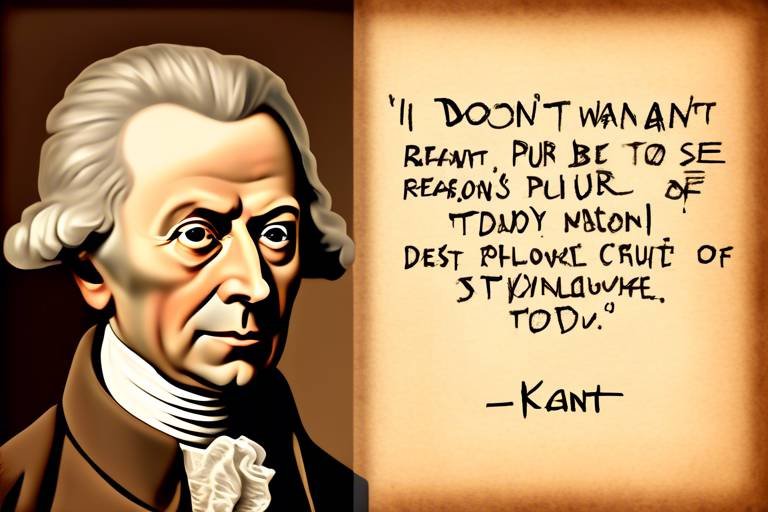Understanding the Philosophy of Pragmatism
Pragmatism is more than just a philosophical doctrine; it’s a way of thinking that prioritizes practical consequences over abstract principles. Imagine walking into a room full of philosophers debating the essence of truth while you sit back, sipping your coffee, and thinking about how these ideas actually play out in the real world. Pragmatism invites us to do just that—focus on what works, what helps, and what is effective in our daily lives. This approach encourages a dynamic understanding of ideas, where the value of a belief is measured by its outcomes rather than its adherence to rigid doctrines.
At its core, pragmatism is about action and experience. It challenges us to ask, "How does this idea affect my life?" instead of getting lost in the abstract. Think of it as a toolbox: some tools are great for specific tasks, but if they don't help you achieve your goal, what's the point? This philosophy emerged in the late 19th century, shaped by the intellectual contributions of thinkers like Charles Sanders Peirce and William James. They were not just philosophers; they were practical thinkers who recognized that ideas must be tested against the backdrop of real-world applications.
Pragmatism emphasizes that knowledge is not a fixed entity but a fluid concept, evolving with our experiences and interactions. This perspective is particularly relevant in today’s fast-paced world, where change is the only constant. As we navigate through life, our understanding of truth and meaning shifts based on what we encounter. Just as a river carves its path through the landscape, our knowledge is shaped by the experiences we gather along the way.
In the following sections, we will explore the historical roots of pragmatism, its core principles, and how it stands in contrast to other philosophical traditions. We’ll also delve into its contemporary applications, critiques, and the potential it holds for the future. By the end of this exploration, you’ll see that pragmatism isn’t just a relic of philosophical history; it’s a living, breathing approach that can guide us through the complexities of modern life.
- What is pragmatism? Pragmatism is a philosophical approach that evaluates theories or beliefs in terms of the success of their practical application.
- Who are the main figures in pragmatism? Key figures include Charles Sanders Peirce, William James, and John Dewey, each contributing unique perspectives to the philosophy.
- How does pragmatism differ from other philosophies? Unlike idealism or realism, pragmatism focuses on the practical outcomes of ideas rather than their abstract truths.
- Can pragmatism be applied today? Yes! Pragmatism is relevant in various fields, including education, politics, and ethics, as it addresses real-world problems effectively.

Historical Roots of Pragmatism
The philosophy of pragmatism emerged in the late 19th century as a powerful response to the prevailing philosophical debates of the time. At its core, pragmatism seeks to understand the meaning of ideas through their practical applications and consequences. This revolutionary approach was primarily shaped by the contributions of key figures such as Charles Sanders Peirce and William James, who laid the groundwork for a philosophy that emphasized real-world outcomes over abstract theorizing.
Peirce, often considered the "father of pragmatism," introduced the concept of the "pragmatic maxim," which suggests that the meaning of any concept can be understood by examining its practical effects. He believed that ideas should be evaluated based on their implications in everyday life. This idea was radical at the time, as it challenged the traditional notion of fixed truths. Peirce's work encouraged thinkers to focus on how concepts could be applied rather than merely discussing their theoretical aspects.
Following Peirce, William James popularized pragmatism through his writings and lectures. James took a more accessible approach, arguing that the truth of an idea is determined by its usefulness and effectiveness in the real world. He famously stated, “The truth of an idea is not a stagnant property inherent in it. It becomes true, is made true by events.” This perspective shifted the focus from objective truths to a more dynamic understanding of knowledge, one that evolves with experience and context.
As pragmatism gained traction, it attracted a diverse range of thinkers and practitioners. Notably, philosophers such as John Dewey expanded on these foundational ideas, applying them to education and social reform. Dewey believed that learning should be rooted in experience and that education should prepare individuals for active participation in a democratic society. His work exemplified how pragmatism could be applied to address societal issues, making it not just a philosophical stance but a practical guide for living.
In the context of its historical development, pragmatism can be seen as a reaction against the rigid dogmas of both idealism and realism. While idealism often prioritizes abstract concepts and metaphysical ideas, and realism focuses on the objective existence of the external world, pragmatism carves out a middle path. It asserts that our understanding of reality is shaped by our experiences and interactions, thus promoting a more flexible and adaptable approach to knowledge.
To summarize, the historical roots of pragmatism are deeply intertwined with the intellectual currents of the late 19th century. The contributions of Peirce, James, and Dewey have established a legacy that continues to influence various fields today. Their emphasis on practical consequences and the importance of lived experience has paved the way for a philosophy that remains relevant in addressing the complexities of modern life.

Core Principles of Pragmatism
At its heart, pragmatism is all about practicality and the real-world implications of ideas. Unlike some philosophical traditions that prioritize abstract reasoning or fixed truths, pragmatism champions the notion that the value of an idea lies in its consequences and applications. This means that rather than getting bogged down in theoretical debates, pragmatists focus on what works in practice. Imagine a toolbox filled with various tools; pragmatism encourages us to choose the right tool for the job based on the situation at hand.
One of the core tenets of pragmatism is the belief in the importance of experience. Pragmatists argue that knowledge is not merely a collection of facts but is deeply intertwined with our lived experiences. This perspective suggests that our understanding of the world is shaped significantly by our interactions and the outcomes of our actions. When we encounter challenges, our responses and adaptations provide valuable insights that contribute to our knowledge base. In a way, this approach is similar to a scientist conducting experiments; through trial and error, we learn what works and what doesn’t.
Another fundamental principle is the rejection of absolute truths. Pragmatists assert that truth is not a fixed entity but rather a fluid concept that evolves over time. This stands in stark contrast to traditional philosophies that uphold the idea of immutable truths. For pragmatists, truth is validated through its practical effects and how well it addresses the needs and issues of society. Consider this: if a theory or belief leads to positive outcomes, it can be deemed 'true' in that context, while a belief that fails to produce beneficial results may be reconsidered or discarded.
To illustrate these principles further, let's break down the core concepts of pragmatism into a table:
| Core Principle | Description |
|---|---|
| Practical Application | Ideas are evaluated based on their practical consequences and real-world applications. |
| Experience | Knowledge is shaped by our interactions and lived experiences, emphasizing learning through doing. |
| Fluidity of Truth | Truth evolves based on practical outcomes and societal needs, rejecting absolute truths. |
In essence, pragmatism invites us to adopt a mindset that is adaptable and responsive to change. It encourages us to embrace uncertainty and complexity, recognizing that the world is rarely black and white. By valuing practical outcomes over rigid doctrines, pragmatism provides a framework that is not only relevant in philosophical discussions but also in everyday decision-making. So, the next time you're faced with a dilemma, think like a pragmatist: focus on what works, learn from your experiences, and be open to adjusting your beliefs as new information arises.
- What is the main focus of pragmatism? Pragmatism focuses on the practical consequences of ideas and their real-world applications.
- Who are the key figures in pragmatism? Key figures include Charles Sanders Peirce and William James, who significantly contributed to its development.
- How does pragmatism differ from other philosophies? Unlike idealism or realism, pragmatism emphasizes outcomes and practicality rather than fixed truths.
- Can pragmatism be applied in everyday life? Yes, pragmatism encourages individuals to make decisions based on what works best in practical situations.

Pragmatism vs. Other Philosophical Traditions
When we dive into the world of philosophy, we often find ourselves navigating through a maze of complex ideas and theories. Among these, pragmatism stands out as a refreshing approach that prioritizes practical outcomes over abstract notions. But how does it stack up against other philosophical traditions like idealism and realism? Let's unravel this intriguing comparison.
At its core, pragmatism is all about action and results. It asks, "What works?" rather than "What is true?" This is a significant departure from idealism, which posits that reality is fundamentally shaped by our ideas and perceptions. Idealists often emphasize the importance of concepts and ideals, suggesting that our understanding of the world is mediated by our thoughts. In contrast, pragmatists argue that ideas should be tested through their practical effects. So, while idealism might lead you to ponder the perfect form of a chair, pragmatism would prompt you to sit in it and see if it’s comfortable.
Realism, on the other hand, takes a more grounded approach, asserting that the world exists independently of our perceptions. Realists believe in a reality that can be observed and described objectively. However, pragmatism introduces a twist here by suggesting that our understanding of that reality is shaped through our interactions with it. This leads to a more dynamic view of knowledge, where truths are not fixed but are instead shaped by our experiences and the outcomes of our actions. So, while realists might focus on the chair's material properties, pragmatists would be more interested in how well that chair serves its purpose in your life.
To illustrate these differences more clearly, consider the following table:
| Philosophical Tradition | Focus | Key Question |
|---|---|---|
| Pragmatism | Practical outcomes and experiences | What works? |
| Idealism | Ideas and concepts | What is true? |
| Realism | Objective reality | What exists independently? |
In summary, while idealism and realism provide valuable insights into the nature of knowledge and existence, pragmatism carves out its own niche by emphasizing the importance of real-world applications. It invites us to engage with our environment and learn from our experiences, making it a philosophy that resonates deeply in our everyday lives. So, the next time you find yourself grappling with a philosophical dilemma, remember that pragmatism encourages you to roll up your sleeves and get your hands dirty in the pursuit of understanding.

The Role of Experience in Pragmatism
When we talk about pragmatism, we can't overlook the profound importance of experience. For pragmatists, experience isn't just a backdrop; it’s the very fabric of understanding and knowledge. Imagine trying to learn how to ride a bike purely through reading about it. Sure, you might grasp the theory, but without actually hopping on and pedaling, you’d miss out on the real essence of the experience. This analogy perfectly illustrates how pragmatism views knowledge as inherently tied to our lived experiences.
Pragmatism posits that our interactions with the world shape our understanding. This means that knowledge is not static; it evolves as we encounter new situations and challenges. Think of it like a sculptor chiseling away at a block of marble. Each tap of the chisel represents an experience, gradually revealing a unique masterpiece. In this way, our experiences refine our ideas and beliefs, allowing them to adapt and grow.
Furthermore, pragmatists argue that experience serves as a testing ground for our ideas. When we propose a theory or a belief, it’s through practical application that we can gauge its validity. If an idea works in practice, it gains credibility; if it fails, we must reassess and adapt. This iterative process is crucial in fields like science, education, and even ethics, where the outcomes of our actions provide essential feedback.
Consider the following aspects regarding the role of experience in pragmatism:
- Dynamic Learning: Knowledge is not a one-time acquisition but a continuous journey shaped by our experiences.
- Practical Testing: Ideas must be tested in real-world scenarios to determine their effectiveness.
- Adaptability: As we gather new experiences, our understanding must adapt, reflecting the fluid nature of truth.
In essence, pragmatism champions the idea that our experiences are invaluable. They are the lenses through which we view the world, and they guide our decision-making processes. By emphasizing the significance of experience, pragmatism encourages a more active engagement with life, pushing us to learn, adapt, and evolve continuously. This perspective not only enriches our understanding of knowledge but also empowers us to navigate the complexities of modern life with confidence and insight.
- What is pragmatism? Pragmatism is a philosophical approach that emphasizes the practical consequences of ideas and their applications in real-world situations.
- Who are the key figures in pragmatism? Notable figures include Charles Sanders Peirce, William James, and John Dewey, who contributed significantly to the development of pragmatist thought.
- How does pragmatism differ from other philosophical traditions? Unlike idealism or realism, pragmatism focuses on the outcomes and practical effects of ideas rather than seeking absolute truths.
- Why is experience important in pragmatism? Experience is crucial as it shapes our understanding and knowledge, allowing us to test ideas and adapt them based on real-world applications.

Truth as a Fluid Concept
In the realm of pragmatism, the concept of truth is anything but static. Instead, it is viewed as a dynamic and evolving entity that is shaped by practical consequences and societal contexts. Imagine truth as a flowing river, constantly adapting to the landscape around it. Just as a river carves its path through the earth, so too does our understanding of truth shift and change based on our experiences and interactions with the world.
Pragmatists argue that rather than seeking an absolute and unchanging truth, we should focus on the utility of our beliefs and ideas. This perspective encourages us to ask questions like, "Does this belief work for me in my daily life?" or "How does this idea help solve real-world problems?" By prioritizing the practical implications of our beliefs, we can navigate the complexities of life more effectively.
One of the key figures in pragmatism, William James, famously stated that "truth is what works." This statement encapsulates the essence of pragmatism's approach to truth. It invites us to consider how our beliefs perform in the real world, rather than getting bogged down in abstract theories. For instance, a scientific theory may be considered "true" if it consistently produces reliable results in experiments, even if it is later revised or replaced as new evidence emerges.
To illustrate this fluidity of truth, consider the following examples:
- Scientific Progress: Scientific truths are often updated as new discoveries are made. What was once accepted as a fact may later be disproven or refined, showcasing the evolving nature of knowledge.
- Moral Beliefs: Societal values change over time. For example, attitudes toward issues like marriage equality have shifted dramatically in recent decades, reflecting a changing understanding of justice and rights.
- Personal Experiences: Our individual truths can shift based on life experiences. A person’s understanding of happiness might evolve from seeking material wealth to valuing relationships and personal fulfillment.
This understanding of truth as fluid does not imply that anything goes or that all beliefs are equally valid. Rather, it emphasizes the importance of context and outcomes in determining the value of a belief. In pragmatism, truth is not merely a matter of opinion; it is assessed based on its ability to address challenges and contribute positively to our lives.
In conclusion, embracing the idea of truth as a fluid concept allows for a more adaptable and responsive approach to knowledge. It encourages us to remain open-minded and flexible, continually reassessing our beliefs in light of new experiences and information. This adaptability is crucial in today's rapidly changing world, where the complexities of life require us to think critically and act pragmatically.
- What is pragmatism? Pragmatism is a philosophical approach that emphasizes the practical consequences of ideas and beliefs, focusing on their real-world applications.
- How does pragmatism view truth? Pragmatism sees truth as fluid and dynamic, shaped by practical outcomes and societal contexts rather than fixed and absolute.
- Who are the key figures in pragmatism? Notable pragmatist philosophers include Charles Sanders Peirce, William James, and John Dewey, each contributing significantly to the development of the philosophy.

Contemporary Applications of Pragmatism
Pragmatism, with its roots deeply embedded in the soil of practical consequences and real-world applications, has found its way into various modern contexts, proving that its relevance is not just a relic of philosophical history but a vibrant part of our contemporary discourse. From education to politics and ethics, the principles of pragmatism guide us in navigating the complexities of our ever-evolving world. But how exactly does this philosophy manifest in our daily lives? Let's take a closer look.
In the realm of education, pragmatism emphasizes experiential learning, where students are encouraged to engage directly with their environment and derive knowledge from their experiences. This approach contrasts sharply with traditional rote learning, which often prioritizes memorization over understanding. For instance, in a pragmatist classroom, students might work on projects that solve real community issues, allowing them to apply theoretical knowledge in practical situations. This not only fosters a deeper understanding of the subject matter but also cultivates critical thinking and problem-solving skills.
Moving into the sphere of politics, pragmatism advocates for policies that prioritize outcomes over ideological purity. Politicians who adopt a pragmatist approach often focus on what works rather than what aligns perfectly with their party's platform. This can lead to more effective governance, as leaders are willing to compromise and adapt their strategies based on the results they observe. For example, a pragmatic politician might support a mix of renewable and non-renewable energy sources to address immediate energy needs while gradually transitioning to more sustainable options. This adaptability is crucial in a world where challenges are multifaceted and ever-changing.
In the field of ethics, pragmatism challenges rigid moral codes by advocating for a more flexible approach that considers the consequences of actions. Ethical decisions are often complex and nuanced; thus, pragmatism encourages individuals to weigh the potential outcomes of their choices. This perspective is particularly relevant in today’s globalized society, where ethical dilemmas often arise from cultural differences and competing values. A pragmatist might argue that the best ethical decision is one that promotes the greatest good for the greatest number, allowing for a more democratic and inclusive approach to morality.
Moreover, pragmatism's emphasis on collaboration and dialogue is evident in social movements. Activists often employ pragmatic strategies to achieve their goals, focusing on building coalitions and finding common ground rather than becoming entrenched in ideological battles. This approach can lead to more effective advocacy and change, as it encourages diverse groups to unite around shared objectives, making it easier to address pressing social issues like climate change, inequality, and healthcare reform.
In summary, the contemporary applications of pragmatism are diverse and impactful. Whether in education, politics, ethics, or social movements, the core tenets of pragmatism—focusing on practical outcomes, valuing experience, and embracing flexibility—allow individuals and groups to effectively navigate the complexities of modern life. As we continue to face new challenges, the pragmatic approach will likely remain a vital tool for innovation and progress.
- What is pragmatism? Pragmatism is a philosophical approach that emphasizes the practical consequences of ideas and the importance of experience in shaping knowledge.
- Who are the key figures in pragmatism? Key figures include Charles Sanders Peirce, William James, and John Dewey, who contributed significantly to the development of pragmatism in the late 19th and early 20th centuries.
- How does pragmatism differ from other philosophies? Unlike idealism, which focuses on abstract concepts, or realism, which emphasizes objective truths, pragmatism prioritizes practical applications and outcomes, making it a more flexible and adaptable philosophy.
- Can pragmatism be applied in everyday life? Absolutely! Pragmatism can guide decision-making in various aspects of life, from personal choices to professional practices, by encouraging a focus on results and adaptability.

Critiques of Pragmatism
Despite its widespread appeal and practical applications, pragmatism is not without its critics. Many philosophers and scholars have raised concerns about the fundamental tenets of this philosophy, arguing that its focus on practical outcomes can lead to a form of relativism that undermines the stability of knowledge and truth. One of the primary critiques is that pragmatism's emphasis on the consequences of ideas can result in a dismissive attitude towards absolute truths. Critics argue that if truth is solely determined by practical outcomes, then it becomes subjective and variable, potentially leading to a chaotic understanding of reality. This perspective raises the question: can we trust any belief or idea if it is constantly shifting based on its utility?
Another significant critique is the challenge of defining what constitutes a 'practical outcome.' Critics contend that pragmatism can become problematic when it lacks clear criteria for assessing the success or failure of ideas. For instance, if a particular belief leads to positive results in one context but fails miserably in another, how do we determine its overall validity? This ambiguity can create confusion in both philosophical discourse and real-world applications. In essence, the critics argue that without a stable foundation for evaluating outcomes, pragmatism risks becoming a slippery slope, where anything can be justified if it appears to yield beneficial results in the short term.
Additionally, some philosophers express concern that pragmatism may inadvertently support a form of intellectual laziness. By prioritizing practical consequences over rigorous analysis and critical thinking, there is a risk that individuals may become more focused on immediate results rather than deeper understanding. This could lead to a superficial engagement with complex issues, where the nuances of ethical considerations, social justice, and long-term implications are overlooked in favor of quick fixes. Critics argue that this tendency could ultimately undermine the philosophical rigor that is essential for meaningful discourse.
Moreover, there is a fear that the pragmatist approach might erode moral and ethical standards. If ethical truths are viewed as flexible and contingent upon their outcomes, then actions that are traditionally deemed unethical could be justified if they lead to favorable results. This raises profound questions about accountability and responsibility in both personal and societal contexts. For example, can we justify harmful actions if they produce a perceived greater good? Such dilemmas highlight the potential dangers of a philosophy that prioritizes practicality over principled ethics.
In summary, while pragmatism offers valuable insights into the relationship between ideas and their practical applications, it also faces significant critiques that challenge its validity and implications. The debate surrounding pragmatism underscores the ongoing struggle to balance practicality with philosophical rigor, and it invites us to consider how we can navigate the complexities of knowledge, truth, and ethics in a world that is often ambiguous.
- What is pragmatism? Pragmatism is a philosophical approach that emphasizes the practical consequences of ideas and beliefs, focusing on their real-world applications rather than abstract principles.
- Who are the key figures in pragmatism? Notable figures include Charles Sanders Peirce, William James, and John Dewey, who each contributed significantly to the development of pragmatist philosophy.
- What are the main critiques of pragmatism? Critics argue that pragmatism can lead to relativism, challenges in defining practical outcomes, potential intellectual laziness, and erosion of moral standards.
- How does pragmatism differ from other philosophies? Unlike idealism and realism, pragmatism focuses on outcomes and the practical application of ideas, rather than seeking absolute truths or fixed principles.

Responses to Critiques
When it comes to the critiques of pragmatism, pragmatist philosophers are not just sitting back and taking the hits; they’re rolling up their sleeves and engaging in a lively debate. One of the most prominent criticisms is the accusation of **relativism**—the idea that if truth is determined by practical outcomes, then it can be anything we want it to be. Critics argue that this leads to a slippery slope where any opinion can be justified as "true" if it works in a given situation. However, pragmatists respond by emphasizing that their approach does not equate to a free-for-all of subjective truths. Instead, they argue that the **validity of a belief** is still grounded in its effectiveness and its ability to solve problems in the real world.
Another common critique focuses on the challenge of defining what constitutes a "practical outcome." Critics often point out that without a clear standard, pragmatism can become ambiguous or even meaningless. In response, pragmatists assert that practical outcomes are not just about immediate results; they encompass a broader scope of **long-term consequences** and societal impacts. This perspective allows for a more nuanced understanding of what it means for an idea to be practical. For instance, consider the implementation of a new educational policy. While it may yield immediate positive feedback, its long-term success can only be evaluated through rigorous assessment over time, taking into account various factors such as student engagement and societal benefits.
Moreover, pragmatists argue that their philosophy is inherently adaptable, making it particularly relevant in our ever-changing world. They emphasize that **flexibility** in thought and practice is not a weakness but a strength. In a landscape where new challenges arise daily, being able to adjust and rethink strategies based on what works best is crucial. This adaptability is what allows pragmatism to remain a dynamic and applicable philosophy, capable of addressing the complexities of modern life.
To illustrate the pragmatic approach in action, consider the field of **public health**. When faced with a health crisis, such as a pandemic, pragmatic thinkers advocate for solutions based on data and outcomes rather than rigid adherence to pre-existing theories. They prioritize strategies that demonstrate effectiveness in real-time, adapting as new information becomes available. This approach not only saves lives but also highlights the pragmatic commitment to **evidence-based practices**.
Ultimately, the responses from pragmatist philosophers to critiques underscore their commitment to a philosophy that is not only about ideas but also about the **real-world implications** of those ideas. By focusing on practical outcomes while maintaining a commitment to rigorous evaluation, pragmatism offers a robust framework for navigating the complexities of truth and knowledge in a rapidly evolving society.
- What is pragmatism? Pragmatism is a philosophical approach that evaluates theories or beliefs based on their practical applications and outcomes.
- Who are the key figures in pragmatism? Major figures include Charles Sanders Peirce, William James, and John Dewey, each contributing significantly to the development of pragmatist philosophy.
- How does pragmatism differ from other philosophies? Unlike idealism or realism, pragmatism focuses on the practical consequences of ideas rather than abstract principles or fixed truths.
- Is pragmatism relevant today? Yes, pragmatism remains highly relevant in various fields, including education, politics, and ethics, as it encourages adaptable and outcome-focused thinking.

The Future of Pragmatism
As we journey further into the 21st century, the philosophy of pragmatism is poised to evolve and adapt in ways that reflect our rapidly changing world. The challenges we face today—be it climate change, technological advancements, or social justice issues—demand a flexible and practical approach to problem-solving. Pragmatism, with its emphasis on outcomes and real-world applications, offers a framework that can help us navigate these complexities.
One of the most exciting prospects for the future of pragmatism lies in its integration with technology. As artificial intelligence and machine learning become increasingly prominent, the pragmatist approach can guide ethical considerations and decision-making processes. For instance, when developing AI systems, pragmatism encourages us to consider not just the technical capabilities but also the societal implications and practical consequences of these technologies. This means asking questions like, "How will this technology impact everyday lives?" and "What are the potential risks and benefits?"
Moreover, the future of pragmatism may also see a resurgence in its application within educational frameworks. Traditional educational models often emphasize rote learning and standardized testing, but pragmatism advocates for experiential learning—where students engage with real-world problems and learn through doing. This shift could lead to a more dynamic and relevant educational experience, preparing students not just to pass exams but to think critically and adaptively in a complex world.
In the realm of politics, pragmatism can serve as a bridge between polarized viewpoints. As societies become more divided, the pragmatic approach encourages dialogue and collaboration, focusing on common goals rather than ideological differences. Politicians and policymakers who adopt a pragmatic stance are more likely to seek solutions that are effective and beneficial for the majority, rather than getting bogged down in partisan debates.
To illustrate the potential pathways for pragmatism's future, consider the following table that highlights key areas where pragmatism can make a significant impact:
| Area | Potential Impact |
|---|---|
| Technology | Guiding ethical AI development and addressing societal implications. |
| Education | Promoting experiential learning and critical thinking skills. |
| Politics | Encouraging dialogue and collaboration across ideological divides. |
| Environmental Policy | Fostering practical solutions to combat climate change. |
Ultimately, the future of pragmatism will depend on its ability to remain relevant and responsive to the needs of society. As we face unprecedented global challenges, the flexibility and practicality that pragmatism embodies will be essential in crafting solutions that are not only innovative but also grounded in reality. This philosophy invites us to remain open-minded and adaptable, ensuring that our approaches to problem-solving are as dynamic as the world around us.
- What is pragmatism? Pragmatism is a philosophical approach that emphasizes the practical consequences and real-world applications of ideas.
- How does pragmatism differ from other philosophies? Unlike idealism, which focuses on abstract principles, pragmatism prioritizes outcomes and practical solutions.
- Can pragmatism be applied in modern contexts? Yes, pragmatism is increasingly relevant in areas such as education, technology, and politics, where practical solutions are necessary.
- What are the critiques of pragmatism? Critics often argue that pragmatism may lead to relativism, making it challenging to define what constitutes a practical outcome.
Frequently Asked Questions
- What is pragmatism?
Pragmatism is a philosophical approach that emphasizes the practical consequences of ideas and beliefs. It focuses on how these ideas can be applied in real-world situations rather than adhering to abstract principles or absolute truths. Essentially, pragmatism asks, "What works?" and values outcomes over theoretical discussions.
- Who are the key figures in the development of pragmatism?
Two of the most influential figures in the development of pragmatism are Charles Sanders Peirce and William James. Peirce is often credited with founding pragmatism, while James popularized the philosophy, emphasizing its practical application in everyday life. Their contributions laid the groundwork for pragmatism as a significant school of thought in philosophy.
- How does pragmatism differ from other philosophical traditions?
Pragmatism stands out from other philosophies like idealism and realism by prioritizing practical outcomes and experiences. While idealism focuses on abstract concepts and realism emphasizes objective truths, pragmatism is flexible and adaptable, arguing that knowledge and truth are shaped by our interactions with the world and can change based on context and results.
- What role does experience play in pragmatism?
Experience is central to pragmatism; it is considered a critical component of knowledge acquisition. Pragmatists argue that understanding is not merely theoretical but is deeply rooted in our lived experiences. This means that the way we interact with the world informs our beliefs and shapes our understanding of truth.
- Is truth considered absolute in pragmatism?
No, pragmatism views truth as a fluid concept that evolves based on practical consequences and societal needs. Unlike traditional philosophies that hold truth as static and unchanging, pragmatists believe that what is considered true can shift as new experiences and outcomes emerge, making it adaptable to changing circumstances.
- How is pragmatism applied in contemporary society?
Pragmatism finds applications in various fields such as education, politics, and ethics. In education, for instance, it encourages experiential learning, while in politics, it promotes policies based on practical outcomes rather than ideological purity. This adaptability makes pragmatism particularly relevant in addressing complex, real-world problems.
- What are some common critiques of pragmatism?
Critics of pragmatism often point to its perceived relativism and the challenges in defining what constitutes practical outcomes. They argue that this flexibility can lead to ambiguity and inconsistency in moral and philosophical reasoning, raising concerns about the lack of a solid foundation for truth and ethics.
- How do pragmatist philosophers respond to critiques?
Pragmatist philosophers defend their approach by emphasizing its adaptability and relevance in a rapidly changing world. They argue that the ability to adjust beliefs and practices based on outcomes is a strength, allowing pragmatism to address contemporary issues effectively without being tied down by rigid doctrines.
- What does the future hold for pragmatism?
The future of pragmatism looks promising as it continues to evolve and influence various fields. In the 21st century, pragmatism may adapt to new challenges, integrating insights from science, technology, and social change, ensuring its relevance in addressing the complexities of modern life.



















